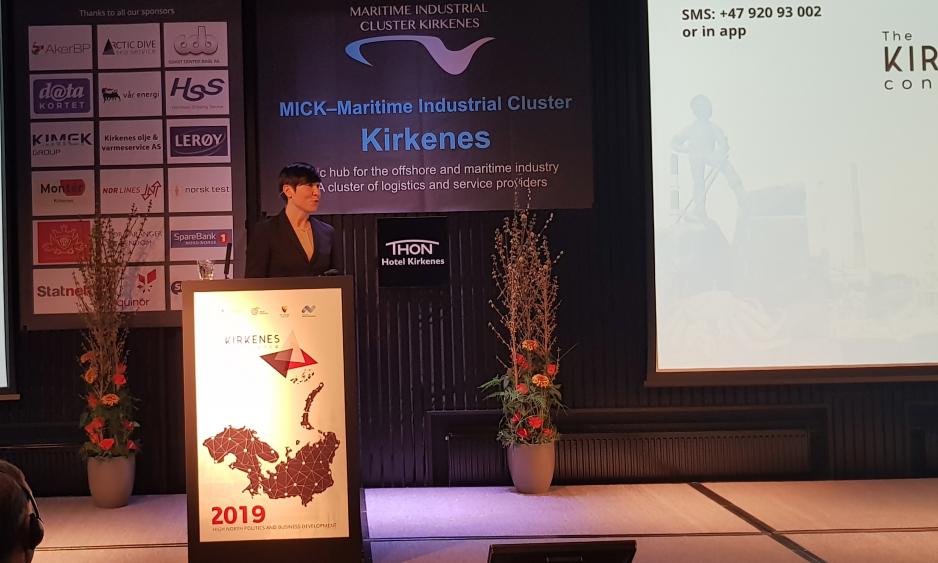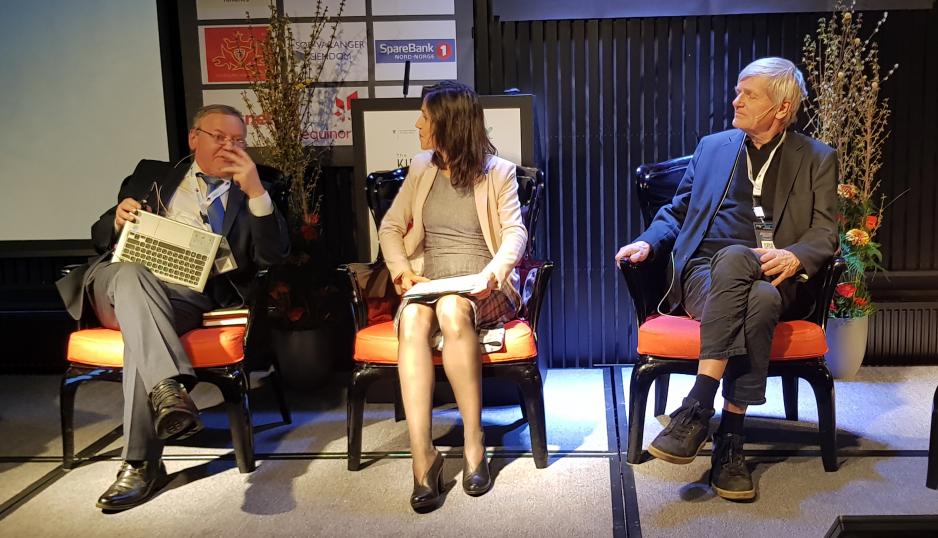Editorial: On the Verge of Cooperation

- We still have extensive political dialogue with Russia, said Foreign Minister Ine Eriksen Søreide at the Kirkenes Conference. (Photo: Arne O. Holm)
I sit on the back bench in a conference hall in Kirkenes and wonder when the rest of the country will discover what goes on in the High North. Foreign Minister Ine Eriksen Søreide and Russian Ambassador to Norway, Teimuraz O. Ramishvili, have just wondered the same from their place on the podium.
Truth be told, they used more diplomatic phrases, but in substance they were rather precise:
The significance of the local
Local engagement, local presence and a robust population plays a key role for Norway’s relationship with Russia. The value of this is not always obvious.
At the same time, this is a kind of knowledge that almost automatically creeps under your skin the moment your plane arrives from the south to Kirkenes airport, Høybuktmoen. The Russian border is then just a few kilometers away. Busses filled with Chinese tourists pour in from Finland, destination Kirkenes. These, says Kirkenes Mayor Rune Rafaelsen, come in addition to more official Chinese delegations looking into investment opportunities in the High North.
The Kirkenes Conference is perhaps the High North conference that more than any other stresses the northerners’ understanding of the challenges and opportunities that lie in Norway’s bordering on Russia. This year’s conference, which is taking place as we speak, is no exception. Perhaps even more so due to the fact that the Barents cooperation’s founding father, former Foreign Minister and international diplomat Thorvald Stoltenberg, died in July last year.
Thorvald Stoltenberg
His close coworker through many years, diplomat Sverre Jervell, vividly described on stage how Stoltenberg eased the Barents cooperation into being despite resistance from Foreign Minister Johan Jørgen Holst and his bureaucrats. Not to mention the internal and external intelligence services. The answer from Stoltenberg was to seek out support from then-Prime Minister Gro Harlem Brundtland.
The key idea of this cooperation, Sverre Jervell said in summary, was for security in relation to the Soviet Union and, with time, Russia, to not only be aimed against the Soviet Union but also with the Soviet Union.
Move forward to 2014 and the Crimea crisis. Then-Foreign Minister Børge Brende used the podium during the Kirkenes Conference, following the annexation, to address Russia in no uncertain terms – and through that also the Russian delegation attending the conference.
Missed shot
Most critics argued, for good reasons, that both the timing as well as the choice of arena represented a missed shot. Dialogue always was and is at the heart of Barents cooperation and the answer to most questions - in particular when neighborly relations are put to the test.
Yesterday’s meeting between Foreign Minister Ine Eriksen Søreide and Ambassador Teimuraz Ramishvili was of a quite different character – without the Norwegian side challenging the principles of the sanction regime in any way. Instead, the Norwegian Foreign Minister spent her allocated speaking time describing all the forms of cooperation and dialogue that are still operative in the relationship between Norway and Russia. Old structures that still last, new initiatives that are made.
This applies in particular to issues related to the ocean. The ocean is exactly what constitutes something of an official explanation for why both Prime Minister Erna Solberg and Foreign Minister Ine Eriksen Søreide have agreed to attend Putin’s gigantic Arctic conference in St. Petersburg in April.
The value of north
However, there is nevertheless a clear distance between the ways in which Norway and Russia describe relations between the two. What Norway refers to as dialogue, Russia describes as Norwegian "statements".
The question many seem to ask themselves at the Kirkenes Conference is how the existing cooperation can be taken one step further.
No clear answers have emerged during the conference.
Perhaps with the exception that both Norway and Russia focus on demonstrating to their respective home countries the value of international cooperation and international initiatives that are taking place every single day in both Northern Norway and Northwestern Russia.
That in itself implies a committment to following up.
A mutual committment.

When Siri Lill Mannes interviewed former diplomat Sverre Jervell (right) and Anatoly Smirnov, the first Russian consul in Kirkenes, it was time for a trip down Memory Lane. (Photo: Arne O. Holm)
This text originally appeared in Norwegian and has been translated by HNN's Elisabeth Bergquist.

